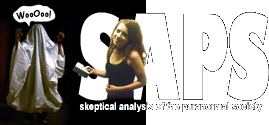Tarot Cards and Cold Readings
The ultimate horoscope
Tarot cards have been around for centuries. No one has been able to say with any certainty exactly where they originated from, only that they made a grand appearance in the fifteenth century. While sometimes called an occult practice, or a form of Satanism, tarot cards have become very common to New Agers and come in a wide variety of themes - from Lord of the Rings to Dragons to Gummy Bears, tarot cards have become an incredibly popular phenomenon.
Each deck contains 78 different tarot cards, divided into the Major and Minor Arcanas. The Major Arcana contains the more famous cards like Death, The Hanged Man, and The Fool wheras the minor arcana is almost like a regular playing card deck with Wands, Cups, Swords, and Pentacles as the suits. Each card is said to contain a different meaning based on where it falls in the "spread", what position the card itself is in (was it turned right side up or upside down?), and what cards surround it. The spread refers to the way that the reader lays out the cards. There are many different spreads used for different purposes, such as telling the future, the outcome of a particular romantic relationship, or the effects of the people around you.
Tarot cards function in much the same way horoscopes do - the meaning of the cards is so vague that any similarity to actual circumstances can be construed as a "hit". For instance, many cards (including The Fool, Death, and The Wheel) can mean "change". No matter what position the card is in in the spread, this can be a completely applicable statement. I can say "In the future, you will have change", "In the past, you have had change", or "Right now, you are in the midst of a change", and all of them are probably true. Whether the change refers to your relationship, your job, your home life, or your social life is left open to interpretation, allowing the person being read to make their own application of this knowledge. Human beings are constantly changing, so this isn't any earth-shattering statement.
Some self-professed tarot card experts explain that in order for a reading to be accurate it must be conducted by a professional. This is because a professional has experience in making a prediction true to you. You may not believe me as completely if I stumble around and am never sure where exactly the change in your life is taking place, whereas if I ask the right series of questions that lead you to reveal it to me, I'm in the clear.
This is called "Cold Reading". Psychics, Fortune Tellers, and people who claim to be in contact with the deceased all use cold reading to discover our motives and make our predictions seem more real. Cold Reading is a learned process that allows you to ask a rapid series of questions or statements designed to glean information from the person being read.
For example, let's say that The Fool (which expresses change or rebirth) turns up in the "Future" spot in your spread. Now, if I am not a professional, I can whip out the booklet that came with my deck of tarot cards and mutter, "You will have a change in your future". But that isn't very impressive. What is more impressive is the addition of some flowery speech. Now, again, I have "The Fool" in the "Future" slot of the spread. I gaze across the table at the person I'm reading for.
"I see a change in your future," I say, "I see a person whose first name starts with 'M'."
"Oh!" you cry, "You mean MICHAEL?!"
"Yes," I say, "He has some kind of power over you that begins this change... As though he is competing with you."
"Yes," you answer, "we work together as data analysts."
"Watch out for Michael," I warn, "he may be trying to get you fired."
Now, up until the part where you reveal that Michael is a co-worker, what I have said can apply to nearly anyone whose name begins with "M". For example, if you are a woman and have a friend named Michelle who is very pretty or very smart or very funny, I could be referring to competition between the two of you for a man's attention. If the "M" person is Max, your husband, you could be competing for your children's attention. Competition is a common theme in daily life, and "M" is a common first letter of names.
Cold Readings are popular amongst people like James Van Praagh, Sylvia Browne, and John Edward. James Randi, ex-stage magician and popular skeptic, once had Sylvia Browne on television. Sylvia was apparently not up to the challenge. She was not allowed any contact with the audience before her "readings", and the audience was instructed to only answer in the affirmative or negative, with no extra information that could help Sylvia make assumptions on people's lives. She failed, and blamed the failure on bad vibrations.
Tarot cards can be fun to use at parties. I myself, in the past, used a deck of regular playing cards to tell "Love Fortunes". Armed with vague meanings of the hearts standing for love and the spades standing for problems, I was able to create incredibly complex fortunes for anyone who wanted to try. I was never, in my entire time of doing this, told I was wrong. I found that whether a statement was obviously true or false had no bearing on its believability, and that people would change the meaning of what I said to fit their own circumstance.
For further reading:
- http://www.allabouttheoccult.org/tarot-cards.htm
- http://www.crystalinks.com/tarot.html
- http://science.howstuffworks.com/tarot-card6.htm
- http://www.aeclectic.net/tarot/basics/index.html
- http://www.randi.org/library/coldreading/
- http://www.usgamesinc.com/home.php?cat=3
Back to the reports.
